Opinion & analysis
A Caravan of Love: Protest, Atonement and Conscience
Published
8 years agoon
By
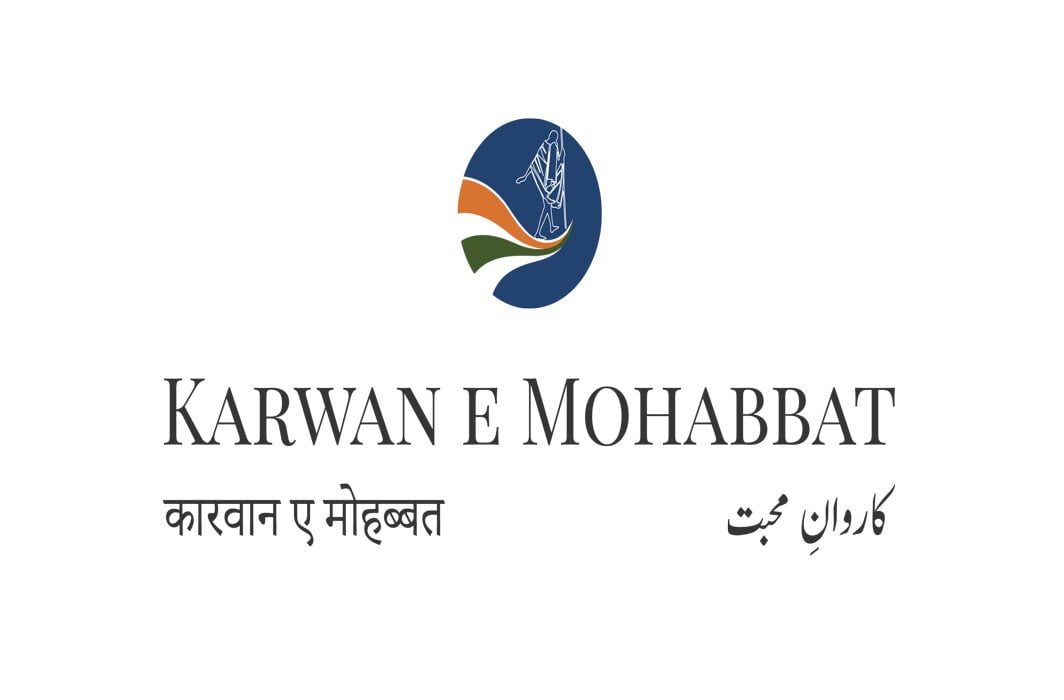
[vc_row][vc_column][vc_column_text]- By Harsh Mander
‘Darkness can never be fought with darkness, only light can dispel the enveloping shadows. And so also a politics of hate can only be fought with a new and radical politics of love and solidarity.’
Many countries in the world are witnessing the rise of authoritarian and chauvinistic political parties, which legitimise hatred against minorities, and suppress liberal and left dissent. In some countries, such parties and leaders are elected to power, such as the United States, Turkey, Hungary and India. In others, like France and Germany, they may not have succeeded in capturing power but their broadening electoral appeal reflects a rising and intensely worrying constituency for hate in growing numbers of countries across the planet.
A major target of these parties (in countries in which Muslims constitute a minority) are Muslim citizens and immigrants. Other minorities are also targeted such as people of colour, other religious, ethnic and sexual minorities. Liberal defenders of these targeted communities, in the media and civil society, are typically attacked, intimidated and gagged by these governments.
A dominant challenge of our times, therefore, is to craft instruments to fight this kind of politics, of what I call ‘command hate’, as this is bigotry and hate that are fostered, encouraged and legitimised by the elected leaders of countries like the United States and India.
Convinced that the politics of hate can be effectively fought only with a politics of love, in an article calling for a resounding people’s response, I wrote, echoing Mahatma Gandhi, Martin Luther King, and Mandela, ‘Darkness can never be fought with darkness, only light can dispel the enveloping shadows. And so also a politics of hate can only be fought with a new and radical politics of love and solidarity. In battling ideologies that harvest hate, we can win only equipped with this love. We need to garner across our land a plenitude of acts of love’.
The test is much greater because the hate that we must fight is not just ‘out there’ but within ourselves or those we are close to, reflected in our resounding silences and our political choices. I wrote, ‘We must resolutely fight…governments and policepersons who betray their constitutional duties; and the hate attackers, ensuring that they be tried and punished under the law of the land. But I believe our greatest, hardest battle will have to be with the bystander. With ourselves. And with our own. We need to interrogate the reasons for our silences, for our failures to speak out, and to intervene, when murderous hate is unleashed on innocent lives. We need our conscience to ache. We need it to be burdened intolerably’.
To speak in this way to our collective silences, I proposed a journey of shared suffering, of atonement and of love, called Karwan-e-Mohabbat, or a Caravan of Love. I proposed that we travel across the country, to meet families who lost their loved ones to hate lynching violence. With pain and shame, to seek from them our collective forgiveness, an atonement, to try a little to share their suffering. And to speak to them of our solidarity and love, and our resolve that justice must be done.
Within just a month after my appeal was published, the Karwan (Caravan) set off on 4 September 2017. Entirely crowd-funded, and with an exceptional group of volunteers – writers, journalists, social workers, teachers, lawyers – we intersected India from east to west over a month, traversing Assam, Jharkhand, Karnataka, Delhi, Western Uttar Pradesh, Haryana, Rajasthan and Gujarat.[/vc_column_text][vc_raw_html]JTNDYmxvY2txdW90ZSUyMGNsYXNzJTNEJTIydHdpdHRlci10d2VldCUyMiUyMGRhdGEtbGFuZyUzRCUyMmVuJTIyJTNFJTNDcCUyMGxhbmclM0QlMjJlbiUyMiUyMGRpciUzRCUyMmx0ciUyMiUzRU9uJTIwdGhlJTIwZXZlJTIwb2YlMjAlM0NhJTIwaHJlZiUzRCUyMmh0dHBzJTNBJTJGJTJGdHdpdHRlci5jb20lMkZoYXNodGFnJTJGR2FuZGhpSmF5YW50aSUzRnNyYyUzRGhhc2glMjZhbXAlM0JyZWZfc3JjJTNEdHdzcmMlMjU1RXRmdyUyMiUzRSUyM0dhbmRoaUpheWFudGklM0MlMkZhJTNFJTJDJTIwdGhlJTIwJTNDYSUyMGhyZWYlM0QlMjJodHRwcyUzQSUyRiUyRnR3aXR0ZXIuY29tJTJGa2Fyd2FuZW1vaGFiYmF0JTNGcmVmX3NyYyUzRHR3c3JjJTI1NUV0ZnclMjIlM0UlNDBrYXJ3YW5lbW9oYWJiYXQlM0MlMkZhJTNFJTIwcGF1c2VkJTIwYXQlMjBTYWJhcm1hdGklMjBBc2hyYW0lMkMlMjByZW1lbWJlcmluZyUyMGhpcyUyMGxhc3QlMjBkYXlzJTIwc3BlbnQlMjBiYXR0bGluZyUyMGNvbW11bmFsJTIwdmlvbGVuY2UuJTIwJTNDYSUyMGhyZWYlM0QlMjJodHRwcyUzQSUyRiUyRnQuY28lMkZnTWJHbTBpQk1aJTIyJTNFcGljLnR3aXR0ZXIuY29tJTJGZ01iR20waUJNWiUzQyUyRmElM0UlM0MlMkZwJTNFJTI2bWRhc2glM0IlMjBOYXRhc2hhJTIwQmFkaHdhciUyMCUyOCU0MG5hdGFzaGFiYWRod2FyJTI5JTIwJTNDYSUyMGhyZWYlM0QlMjJodHRwcyUzQSUyRiUyRnR3aXR0ZXIuY29tJTJGbmF0YXNoYWJhZGh3YXIlMkZzdGF0dXMlMkY5MTQ0NTkzMzMxNDgyNDE5MjAlM0ZyZWZfc3JjJTNEdHdzcmMlMjU1RXRmdyUyMiUzRU9jdG9iZXIlMjAxJTJDJTIwMjAxNyUzQyUyRmElM0UlM0MlMkZibG9ja3F1b3RlJTNFJTBBJTNDc2NyaXB0JTIwYXN5bmMlMjBzcmMlM0QlMjIlMkYlMkZwbGF0Zm9ybS50d2l0dGVyLmNvbSUyRndpZGdldHMuanMlMjIlMjBjaGFyc2V0JTNEJTIydXRmLTglMjIlM0UlM0MlMkZzY3JpcHQlM0U=[/vc_raw_html][vc_column_text]As we travelled, I wrote an update late every night as we tried to catch a few hours of sleep.
The Karwan found everywhere minorities, most of all Muslims, living with fear, hate and state violence as normalised elements of everyday living. Distraught families could not understand the sources of so much hate. We also found Dalits brutally attacked by upper caste neighbours if they displayed any assertion. We found single women, branded as witches, subjected to inconceivable medieval cruelty by family and neighbours. Christians in tribal regions are in fear because of violence against priests, nuns and places of worship. But the foremost targets of hate violence by lynching and police killings are Muslims, and it is they who have most abandoned hope.
I have written elsewhere: ‘Against Muslims, the hate weapon of choice is public lynching. We read of lynching of Blacks in America as public spectacles, watched by white families in picnics. In today’s India, this same objective of lynching as public performance is accomplished with the video camera. Most lynch attacks are filmed by the attackers, with images of their victims humiliated, cringing, begging for their lives…We found that lynch videos are widely and avidly shared among young Hindu activists. Probably as evidence of what they see as their valorous exploits. As proof that the state will protect them. As public exhibitions of the humiliation of their enemy communities. And for drafting new recruits to militant Hindu supremacist formations’.[/vc_column_text][vc_raw_html]JTNDYmxvY2txdW90ZSUyMGNsYXNzJTNEJTIydHdpdHRlci10d2VldCUyMiUyMGRhdGEtbGFuZyUzRCUyMmVuJTIyJTNFJTNDcCUyMGxhbmclM0QlMjJlbiUyMiUyMGRpciUzRCUyMmx0ciUyMiUzRVZpbC4lMjBWYWRhdmFsaSUyQ1BhdGFuJTJDR3VqYXJhdCUyQzI1JTIwTWFyY2glM0ElMjAyJTJDMDAwJTIwbWVuJTIwYXR0YWNrZWQlMjB0aGUlMjBNdXNsaW0lMjBiYXN0aS0xJTIwZGVhZCUyQzUlMjBpbmp1cmVkJTJDMTE0JTIwbG9vdGVkJTJDJTIwMTQxJTIwaG91c2VzJTJDbW90b3JjeWNsZXMlMjAlMjZhbXAlM0IlMjBjYXJzJTIwdG9yY2hlZCUyMCUzQ2ElMjBocmVmJTNEJTIyaHR0cHMlM0ElMkYlMkZ0LmNvJTJGTXNZUHJrVlp1MCUyMiUzRXBpYy50d2l0dGVyLmNvbSUyRk1zWVBya1ZadTAlM0MlMkZhJTNFJTNDJTJGcCUzRSUyNm1kYXNoJTNCJTIwS2Fyd2FuJTIwZSUyME1vaGFiYmF0JTIwJTI4JTQwa2Fyd2FuZW1vaGFiYmF0JTI5JTIwJTNDYSUyMGhyZWYlM0QlMjJodHRwcyUzQSUyRiUyRnR3aXR0ZXIuY29tJTJGa2Fyd2FuZW1vaGFiYmF0JTJGc3RhdHVzJTJGOTEwNDI4MzEyNTMwMzI1NTA0JTNGcmVmX3NyYyUzRHR3c3JjJTI1NUV0ZnclMjIlM0VTZXB0ZW1iZXIlMjAyMCUyQyUyMDIwMTclM0MlMkZhJTNFJTNDJTJGYmxvY2txdW90ZSUzRSUwQSUzQ3NjcmlwdCUyMGFzeW5jJTIwc3JjJTNEJTIyJTJGJTJGcGxhdGZvcm0udHdpdHRlci5jb20lMkZ3aWRnZXRzLmpzJTIyJTIwY2hhcnNldCUzRCUyMnV0Zi04JTIyJTNFJTNDJTJGc2NyaXB0JTNF[/vc_raw_html][vc_column_text]The police in almost all the fifty families we met during our travels in eight states registered criminal charges against the victims, and did all they could to protect the accused with kid from being charged, and from spending time in jail. Even more worrying, we found that the police has increasingly taken on the work of the lynch mob. There are tens of instances in both states in which the police itself kills Muslim men, charging them to be cattle smugglers or dangerous criminals, and claiming that they fired at the police.
And we found in all these local communities profound and pervasive failures of compassion. We encountered very little acknowledgment, regret or remorse amongst the upper-caste Hindu communities in any of the states we travelled. They remain convinced that somehow their Muslim and Dalit neighbours deserved their cruel deaths to lynch mobs or police bullets.[/vc_column_text][vc_raw_html]JTNDYmxvY2txdW90ZSUyMGNsYXNzJTNEJTIydHdpdHRlci10d2VldCUyMiUyMGRhdGEtbGFuZyUzRCUyMmVuJTIyJTNFJTNDcCUyMGxhbmclM0QlMjJlbiUyMiUyMGRpciUzRCUyMmx0ciUyMiUzRVZlcnklMjBsb25nJTIwZGF5cyUyMDQlMjAlM0NhJTIwaHJlZiUzRCUyMmh0dHBzJTNBJTJGJTJGdHdpdHRlci5jb20lMkZrYXJ3YW5lbW9oYWJiYXQlM0ZyZWZfc3JjJTNEdHdzcmMlMjU1RXRmdyUyMiUzRSU0MGthcndhbmVtb2hhYmJhdCUzQyUyRmElM0UlMjB3ZSUyMHN0YXJ0ZWQlMjBhdCUyMDclMjBhbSUyQyUyMHZpc2l0ZWQlMjBEYW5nYXdhcyUyQyUyMGhlbGQlMjBhJTIwbWFzc2l2ZSUyMHJhbGx5JTIwaW4lMjBBam1lciUyQyUyMHRoZW4lMjB2aWwlMjBLZWtyaSUyMGFuZCUyMG5vdyUyMEJoaWx3YXJhLiUyMCUzQ2ElMjBocmVmJTNEJTIyaHR0cHMlM0ElMkYlMkZ0LmNvJTJGbTg4UTNxTEt4VyUyMiUzRXBpYy50d2l0dGVyLmNvbSUyRm04OFEzcUxLeFclM0MlMkZhJTNFJTNDJTJGcCUzRSUyNm1kYXNoJTNCJTIwU2FuanVrdGElMjBCYXN1JTIwJTI4JTQwc2FuanVrdGElMjklMjAlM0NhJTIwaHJlZiUzRCUyMmh0dHBzJTNBJTJGJTJGdHdpdHRlci5jb20lMkZzYW5qdWt0YSUyRnN0YXR1cyUyRjkwOTA4NjQ5MjA0MzA3NTU4NCUzRnJlZl9zcmMlM0R0d3NyYyUyNTVFdGZ3JTIyJTNFU2VwdGVtYmVyJTIwMTYlMkMlMjAyMDE3JTNDJTJGYSUzRSUzQyUyRmJsb2NrcXVvdGUlM0UlMEElM0NzY3JpcHQlMjBhc3luYyUyMHNyYyUzRCUyMiUyRiUyRnBsYXRmb3JtLnR3aXR0ZXIuY29tJTJGd2lkZ2V0cy5qcyUyMiUyMGNoYXJzZXQlM0QlMjJ1dGYtOCUyMiUzRSUzQyUyRnNjcmlwdCUzRQ==[/vc_raw_html][vc_column_text]They expressed their anger and hostility to the Karwan at many points. In one leg, they became violent. The Karwan had resolved the next morning to place flowers at the site of Pehlu Khan’s lynching, in his memory and the memory of others like him who fell to hate violence. the Vishwa Hindu Parishad, the Hindu Jagran Manch and the Bajrang Dal announced that they would not allow the Karwan to enter Behror and pay tribute at the lynch site. The local administration also tried hard to dissuade us. They said that a furious mob had gathered there with stones and sticks and would cause me harm. I said I was prepared for it, and would not agree to discard the plans of a floral tribute. I said I would go there alone as I did not want to risk any of my Karwan colleagues being attacked or hit by a stone.
I quote from my update: ‘I began to walk to the site, but the police physically blocked me. I then sat on the ground in a spontaneous dharna (sit-in). They would have to either arrest me, or allow me to walk to the location and make my floral tribute. I sat for about half an hour, as they confabulated.
Finally they relented.
With two fistfuls of marigold flowers, and surrounded by a few policepersons, I walked the couple of hundred years to the spot where the ageing cattle trader Pehlu Khan had been cruelly lynched by a mob. It was a dirty nondescript stretch of a sidewalk. I knelt down there, and said, ‘I am not a believer, so I cannot pray. But I believe in insaniyat aur insaaf- humanism and justice. Therefore, for humanism and justice, I place these flowers here. In memory not just of Pehlu Khan, but of hundreds of others like him who have fallen to hate violence across our land’.[/vc_column_text][vc_raw_html]JTNDYmxvY2txdW90ZSUyMGNsYXNzJTNEJTIydHdpdHRlci10d2VldCUyMiUyMGRhdGEtbGFuZyUzRCUyMmVuJTIyJTNFJTNDcCUyMGxhbmclM0QlMjJlbiUyMiUyMGRpciUzRCUyMmx0ciUyMiUzRUhhcnNoJTIwTWFuZGVyJTIwc2l0cyUyMGluJTIwZGhhcm5hJTIwbmVhciUyMHdoZXJlJTIwUGVobHUlMjBLaGFuJTIwd2FzJTIwbHluY2hlZCUyMGluJTIwQmVocm9yJTJDJTIwUmFqYXN0aGFuJTIwJTNDYSUyMGhyZWYlM0QlMjJodHRwcyUzQSUyRiUyRnQuY28lMkZMemZ1WkR6N1dxJTIyJTNFcGljLnR3aXR0ZXIuY29tJTJGTHpmdVpEejdXcSUzQyUyRmElM0UlM0MlMkZwJTNFJTI2bWRhc2glM0IlMjBLYXJ3YW4lMjBlJTIwTW9oYWJiYXQlMjAlMjglNDBrYXJ3YW5lbW9oYWJiYXQlMjklMjAlM0NhJTIwaHJlZiUzRCUyMmh0dHBzJTNBJTJGJTJGdHdpdHRlci5jb20lMkZrYXJ3YW5lbW9oYWJiYXQlMkZzdGF0dXMlMkY5MDg1NDk4NzM0ODEzNzU3NDQlM0ZyZWZfc3JjJTNEdHdzcmMlMjU1RXRmdyUyMiUzRVNlcHRlbWJlciUyMDE1JTJDJTIwMjAxNyUzQyUyRmElM0UlM0MlMkZibG9ja3F1b3RlJTNFJTBBJTNDc2NyaXB0JTIwYXN5bmMlMjBzcmMlM0QlMjIlMkYlMkZwbGF0Zm9ybS50d2l0dGVyLmNvbSUyRndpZGdldHMuanMlMjIlMjBjaGFyc2V0JTNEJTIydXRmLTglMjIlM0UlM0MlMkZzY3JpcHQlM0U=[/vc_raw_html][vc_column_text]I returned to the bus, and the police bundled us rapidly into the bus. As we drove past, the protesting men threw a few stones at the bus.
On the way, people of the small town Kothputli had planned a small welcome to the Karwan. But in the presence of the police, a bunch of young men arrived, tore down the banners and threw away the flowers. The police said they were helpless to stop them. The police then asked just two organisers to meet the bus outside the police station. I emerged with a couple of colleagues, and the policemen said we had only a couple of minutes. They handed over packets of packed breakfast, and a few men gathered. One of them took off his shoe to throw, as the bus drove away. We stopped the bus long enough to throw out flowers.
The Karwan now had police escort vehicles both ahead and following its bus. It was only with this that the state administration would allow the Karwan to travel through Rajasthan. A sad day when a caravan of love can travel only with the protection of the police. We don’t need or deserve protection; it is the bereaved families who we have met these days of the Karwan who the police should protect, but it is they who they fail so profoundly’.
It was clear that the government was troubled by the Karwan, as its discourse of love, and the evidence it gathered about how widespread was the fear and hate that its policies had fostered. We learnt that all big newspapers and TV channels were advised to blank out news of the Caravan. Many, but not all, complied with these pressures. Despite everything, many stories – my daily updates, and several articles by Karwan travellers – appeared both on-line and in print.
In a television debate when the Karwan was being blocked from placing flowers, a leader of the RSS angrily decried my credentials (following up with many tweets describing me as a scoundrel, and the social media soon filled with abusive trolls slandering my work). He also said that the funds of ‘my’ NGO must be investigated thoroughly.
Not wasting time, just four days later, the Centre for Equity Studies, of which I am a founding member and Director received tax notices. I issued this press note: ‘In a television debate on 14 September 2017, in NDTV’s Left, Right and Centre anchored by Nidhi Razdan, I joined by phone from the Karwan bus. Mr Rakesh Sinha of the RSS during the debate made angry personalised attacks against me. He also said that I was against the RSS. I replied that I am indeed against the ideology of the RSS, because its belief in a Hindu Rashtra (Nation) contravenes the Indian Constitution. During this same debate, Mr Sinha said, in a barely veiled threat, that the funding of ‘my’ organisations would be investigated. The next morning, despite stone-throwing mobs, I did finally prevail in placing flowers at the site of Pehlu Khan’s lynching.
Four days later, an organisation of which I am the Director and one of the founders, the Centre for Equity Studies, received by email a notice under Section 143 (2) of the Income Tax Act for a Full Scrutiny of the income tax returns of the Centre for Equity Studies for the year 2016-17.
The Income Tax Department may claim that this is just a routine notice. But the timing of the notice shortly after the public threat for getting the funding of ‘my’ organisations investigated, and the fact that less than 1 per cent of returns are scrutinised, suggest that this could well be an act of state vengeance and intimidation.
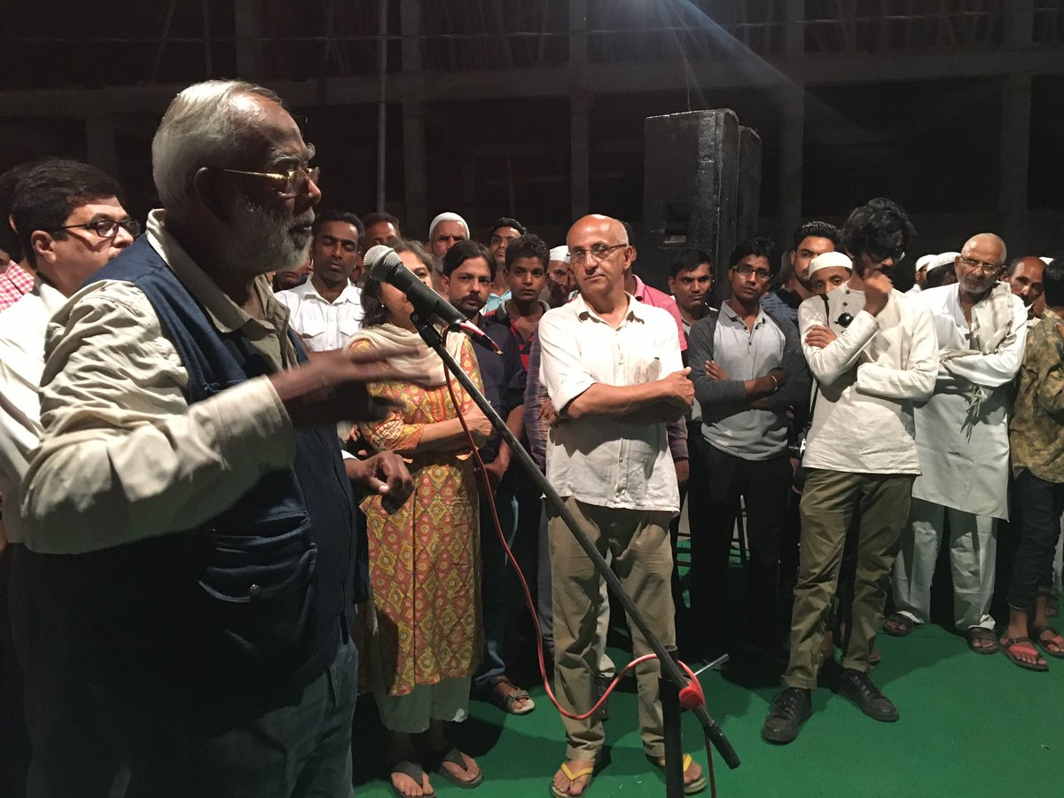
I would also like to point out that the Centre for Equity Studies had nothing whatsoever to do with the Karwan-e-Mohabbat. It brings out the annual India Exclusion Report, and works with homeless persons and other vulnerable groups.
We are happy to subject ourselves to any scrutiny, as we believe in public accountability. But I would like to state categorically that no amount of state intimidation of the organisations that I am associated with, would succeed to silencing my public dissent with policies and ideologies that I believe are detrimental to India’s constitutional values’.
The work that the Centre does is precious to me. But at times like this, I believe that there is no higher duty than public dissent. This is not an act of particular valour, just that no other option is acceptable. As I wrote to my colleagues, ‘They can cancel our FCRA (permission to receive foreign funds). Shut down the organisation. How does it matter? This would be an infinitely small fraction of the suffering we bore witness to in the Karwan.’
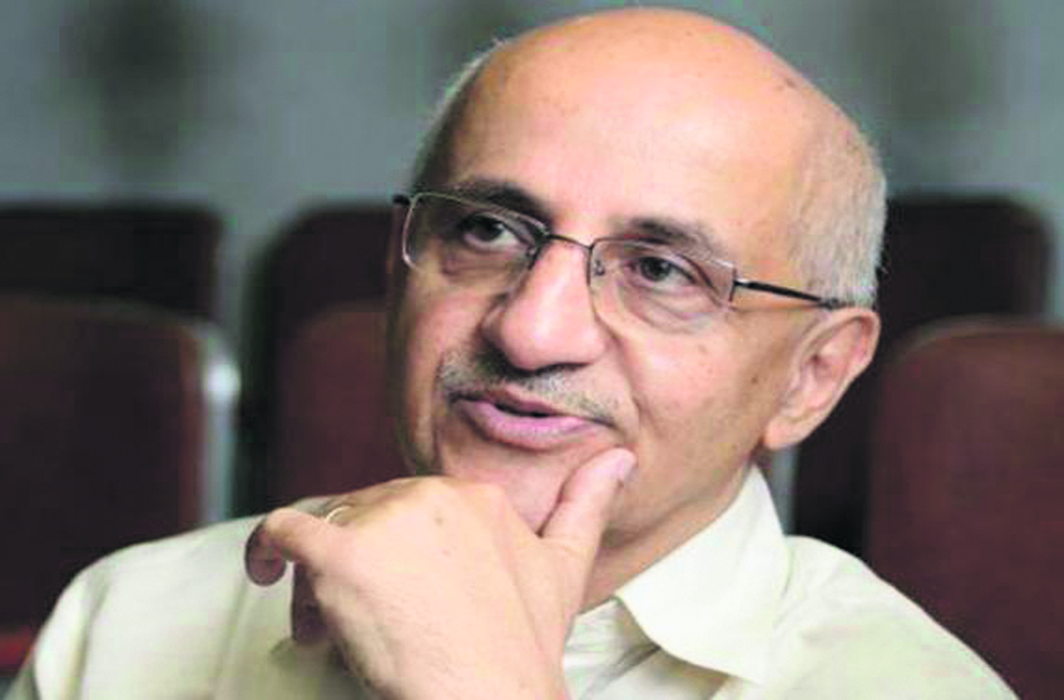
(The writer is a former IAS officer and activist)[/vc_column_text][/vc_column][/vc_row]
You may like
-
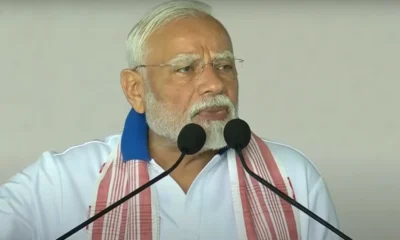

Somnath Temple attacks reinforced India’s cultural unity, says PM Modi ahead of visit
-
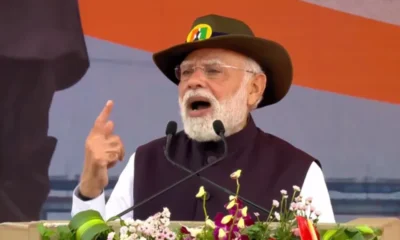

Sardar Patel wanted to unite entire Kashmir with India, Nehru did not allow it: Modi
-
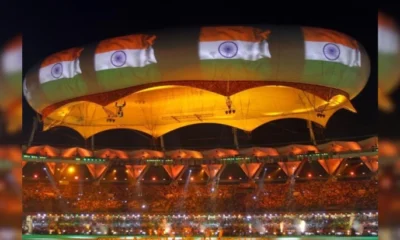

Ahmedabad recommended as host city for 2030 Commonwealth Games, final decision on November 26
-
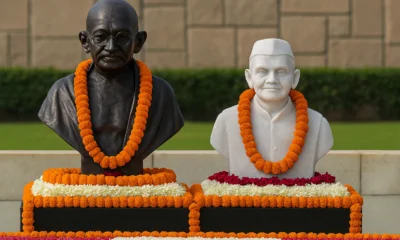

PM Modi pays tributes to Mahatma Gandhi and Lal Bahadur Shastri on birth anniversary
-


Gujarat: 17 killed, several feared trapped after firecracker factory collapse in fire in Banaskantha
-


Rahul Gandhi writes to PM Modi seeking cancellation of tenders for offshore mining in Kerala, Gujarat, Andaman and Nicobar Islands
Opinion & analysis
Never say never again: Nitish Kumar’s expertise at hoodwinking allies shines through!
Nitish Kumar does it again!
Published
4 years agoon
August 9, 2022By

By Vikram Kilpady
Possibly the first state government to fall after the ascendance of the Modi-fied BJP without that party’s hand in the machinations has just shaken up the political landscape in Bihar, and the country. Nitish Kumar has pulled the rug from under the feet of the party. But since history has seen several turns first as a tragedy then as a farce, as noted by Hegel and Marx, Nitish Kumar possibly has the last laugh since he’s done the tragedy-farce duo twice. First, with the Rashtriya Janata Dal and, now, with the BJP, which among its many leaders has one man who gets called Chanakya way too often.
Once the party with a difference, the BJP has mastered the game of overturning elected governments; Madhya Pradesh where a maharajah switched to his aunt’s party, twice in Goa where elected Congress MLAs found faith in a new boss, Maharashtra where the cadre-strong Shiv Sena was ripped apart by a minister’s ambition, Karnataka where Operation Lotus blossomed first and spread its petals across the country.
Soon after the Modi magic of 2014, the dispirited opposition found new hope in the victory of Nitish Kumar and Lalu Yadav in the Bihar elections of 2015. But that was short-lived, Nitish found himself stifled by the ambition of Tejashwi Yadav and changed his mind, walking back to the BJP, which was eager to support him.
The 2020 election had the writing on the wall written in a more legible hand. The BJP won 74 seats, just one short of the party with the most seats, the RJD, which won 75. Nitish Kumar came third with 43 seats. The BJP was gaining at the cost of the Janata Dal United, which beat down Chirag Paswan’s rhetoric but couldn’t manage enough MLAs. The national party cannibalised its partner several times over throughout their association. The symbiosis of the initial years under Vajpayee was becoming a brain and brawn drain for the JDU. The election results were not free from controversy though, with the RJD alleging ballot boxes were changed in the middle of the night. The elections may have been won by the BJP and Nitish Kumar, helped by the image of Prime Minister Narendra Modi, but politics is not just platitudes, it also involves dirty work.
The use of RCP Singh by the BJP pointed at the potential of a Shiv Sena redux in the JDU, prompting the old fox to return to familiar Janata buddies, though once stabbed and all. But what is politics without the choosing of strange bedfellows, even if it borders on promiscuity and worse.
Read Also: Bihar BJP accuses Nitish Kumar of betraying Bihar people
The other angle to see the Bihar turn is from the lens of national politics. The idea of a country rid of the primary opposition party, aka becoming Congressmukt Bharat, has gained popular acceptance among the many for whom democracy is just voting in a new government. The turning of the Congress from its trademark white kurta to black attire was seen as a gimmick by the mainstream media. Far from a gimmick, the party was using what it encountered in Tamil Nadu where it rides on an ally’s stronger connect. The DMK’s parent, the Dravidar Kazhagam and its offshoots, still wears black shirts in protest against the idea of a homogenous India smearing over the vast differences between the country’s many constituents. With Hindutva becoming that all-unifying glue being applied by the BJP across the length and breadth of India, the Congress’s choice of black shows a new savvy.
Covid may have eclipsed the economy but many other slights and the worsening employment situation have India on uneven terrain. The Centre has to hold, but with accountability of successive state governments now enveloped buried in the image of the much-sought-after Strongman, an image that papered over the stark inadequacies of his administration, and won him and his party elections handsomely. The country was wearily dragging its battered economic self for another election some two years away. Nitish Kumar’s somersault has brought realpolitik back into the mix but investing all hope in serial side-switchers can be harmful for one’s emotions and well-being.
To be a rock for the Opposition, Nitish Kumar should not roll. But can old dogs learn new tricks?
Nitish Kumar stakes claim to form new Mahagathbandhan government in Bihar
India News
Yearender 2021: When hate uncovered its face
Instead of protecting victims of such incidents, the perpetrators not only enjoy immunity from the law, but also the administration in BJP-ruled states punishes victims. The use of false cases and arrests under draconian laws like UAPA are the preferred weapons.
Published
4 years agoon
December 31, 2021By
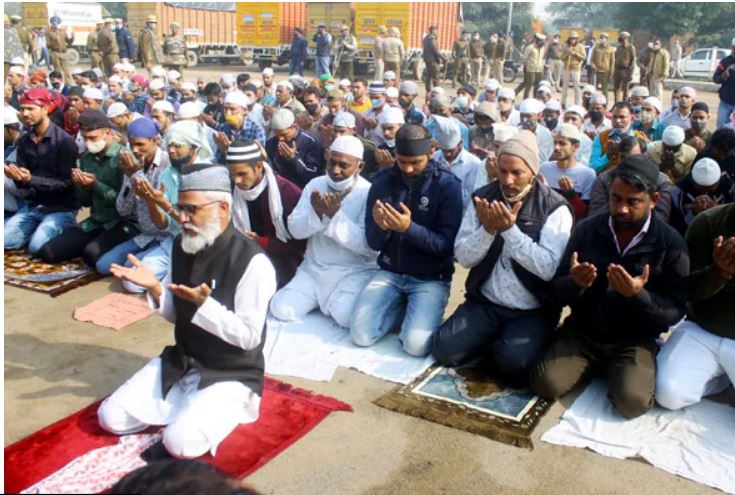
By Mohammad Javed Rasheedi
2021 is about to melt into 2022 in less than 48 hours. Majoritarian politics continued to hold its way over the country this year. But this year, it was not just Muslims but also Christians who felt the heat of Hindutva attacks across India as right-wing Hindu groups waged a culture war against them. Several churches have been attacked and statues of Jesus broken, the latest being in Ambala’s Army Cantonment, the scene of many a Rudyard Kipling work.
December saw targeted hate speeches against minorities. The one at Haridwar saw many participants vow to even take up weapons to redeem their faith by killing non-Hindus. The Hindu right-wing has waged war against Christians accusing them of religious conversion through their missionary work and Muslims for Love Jihad, an Islamophobic trope singling out Muslim men for falling in love with Hindu women and then converting them into Islam. However, such allegations targeting minorities have become a cornerstone of Hindu right-wing nationalism.
The Association for the Protection of Civil Rights, United Against Hate, and United Christian Forum jointly released a fact-finding report highlighting the series of attacks on churches and hate speech against Christians across India. According to the report, India has recorded more than 300 attacks on Christians and worship places within the first nine months of 2021.
Of the 305 incidents, 66 took place in Uttar Pradesh, 47 in Chhattisgarh and at least 32 in Karnataka.
While another report of the United Christian Forum had claimed that India reported more than 400 incidents of violence against Christians across the country. Among those, the incident involved storming churches, burning Christian literature, attacking schools and assaulting worshipers.
However, it is shocking that only 30 FIRs have been registered so far in these cases. On many occasions, restrictions were imposed on people to carry out religious ceremonies.
First on the list of attacks is the one on October 3, where a mob of 250-300 persons barged into a Roorkee church in Uttarakhand and attacked people, destroyed CCTV cameras, and vandalized church premises. Many reports said there were only 12 inside the church for prayers when the attack took place.
Apart from this, the attacks on churches were also reported from BJP-ruled states Haryana, Uttar Pradesh, Madhya Pradesh and Karnataka. And these attacks have taken place over allegations of religious conversion. Christians prayers meetings have also been stopped by the same Hindu mob who had stopped Jumma namaz in the so-called Millennium City, Gurugram. The city also saw an attack on a school’s Christmas celebration.
In the last week of 2021, the bank accounts of Mother Teresa’s Missionaries of Charity were frozen over FCRA claims, West Bengal Chief Minister Mamata Banerjee tweeted about the heartlessness behind the move affecting the charity of the outfit.
Some 22,000 patients and employees have been left without food and medicines, the West Bengal Chief Minister had tweeted.
The Missionaries of Charity was founded in 1950 by the late Mother Teresa, a Catholic nun from Macedonia, who moved to India and took care of the destitute and the poor and won the Nobel Peace Prize in 1979 for her work.
Hate speeches have been curtailed by some norms, keeping them among friends and family. The last week of 2021 saw more public hate speeches in the country. The controversial Dharam Sansad organized in Haridwar, other such events in Delhi and Chattisgarh saw where priests and leaders taking an oath to kill Muslims, and even urged Hindus to arm themselves against the Muslims to make India a Hindu Rashtra.
With next year’s assembly elections in Uttar Pradesh, Uttarakhand, Punjab, Goa and Manipur due shortly, the increase in such hate is an attempt at reviving polarisation.
The violence in Tripura, where VHP hoodlums attacked Muslims and vandalized some of their mosques and Friday prayers disruptions at designated places at Gurugram were also the prime example of rising hate against Muslims.
Anti-Hindu violence in parts of Bangladesh triggered violence in Tripura. The communal riots erupted on October 26 after a rally organized by the Vishwa Hindu Parishad to protest against the attacks on Hindus in Bangladesh turned violent.
The VHP and the Hindu Jagran Manch organized rallies in different parts of the state to protest against the violence in Bangladesh. Later, the VHP and other right-wing groups denied any role in the violence.
The anti-Hindu violence in Bangladesh, which erupted during the Durga Puja festival, was triggered by rumours that the Quran had been insulted in one of the pavilions set up for the celebrations. Seven people were killed, several temples desecrated, and hundreds of houses and business establishments of the Hindu minority were torched.
However, many Muslim groups alleged political conspiracy claiming that the minorities were being targeted in the north eastern state. There were many arrests and some journalists covering the riots in Tripura were also detained. Those who tweeted in favour of Tripura’s Muslims also found themselves being served notices by the state police.
The Uttar Pradesh government had faced severe criticism from the opposition over the killings of Kasganj youth Altaaf in mysterious circumstance. He had been arrested on suspicion of eloping with a Hindu woman. Again, the smoldering love jihad theory. The law and order in Uttar Pradesh, which had earlier won so much praise from PM Modi and other BJP leaders, has been roundly criticized by opposition parties in Uttar Pradesh.
The family of the deceased had alleged that he was tortured by police in the lockup, which led to his death. Police claimed the accused killed himself using the drawstring of his jacket’s hood when he went to the lockup washroom.
Apart from mob lynching, Muslim street vendors in Ahmedabad and some parts of Madhya Pradesh and other parts of the country have been threatened and disallowed from pursuing their livelihood. In Ahmedabad, the Hujarat High Court stepped in to tell off the civic authority to desist from such measures. In Assam, poor peasant families cultivating land for decades were brutally evicted only because they belonged to the Muslim minority. The point-blank shooting of Moinal Haque by police personnel caught on video and the subsequent death dance by a photographer with the remains indeed were a mirror for the crumbling facade of secular India, now overtaken by an aggressive mindless herd mentality spewing hate and violence.
Read Also: Masik Shivratri 2022: Know date, shubh muhurat, puja vidhi, significance
An empty desolate car park outside Sector 37 police station in Gurugram where Muslims had performed Friday prayers for more than a decade turned into a battleground of faith. Hindu right-wing groups staged protests, sloganeered during Friday prayers and held a Govardhan puja at the namaz site just to deny namaz here.
Instead of protecting victims of such incidents, the perpetrators not only enjoy immunity from the law, but also the administration in BJP-ruled states punishes victims. The use of false cases and arrests under draconian laws like UAPA are the preferred weapons.
Haryana news
Dushyant Chautala stood up for farmer’s cause; opposition failed
The Indian farmer constitutes 40 per cent of the country and an even higher percentage of its poor and as the available data points out, is under immense stress.
Published
5 years agoon
July 9, 2021By
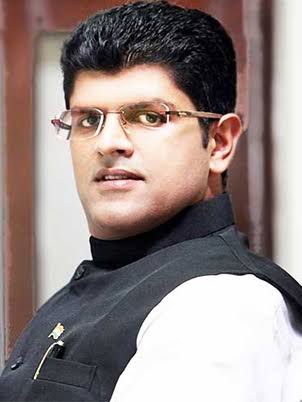
By Prateek Som
The Indian farmer constitutes 40 per cent of the country and an even higher percentage of its poor and as the available data points out, is under immense stress. The modernization of the central farm laws is nothing but an adaptation of provisions which already exist in many states, including Punjab and Haryana. How come the three acts become anti-farmer in some states and why not in many others is something the activists themselves cannot explain.
Big states like Uttar Pradesh, Bihar, Maharashtra, West Bengal, Rajasthan are not even a part of the farmers’ agitation and there is no protest against the central or state government in these states, despite the fact that BJP is not in power in some of these states. More importantly, some agriculturists and several economists have been campaigning for abolishing MSP based procurement as it is unfairly tilted towards a few states like Punjab.
The Central government has neither abolished the MSP nor does it say anything against it in the laws. If, despite this, the impression is being spread that MSP is to be abolished, this is clearly mischievous. The activists are not only spreading the misinformation about the MSP abolition but they are asking for an unreasonable clause in the law for unlimited MSP based procurement which was never a part of the previous laws related to agriculture and APMC acts.
The Indian farm bills are in line with international precedence wherein a number of developing economies have been making changes to their agriculture policies since the 1990s to encourage private sector involvement which would provide a major fillip to the sector. The International Monetary Fund has also backed the recent farm acts as being an important step in the right direction. Despite all the supportive arguments in the favour of the laws, India has seen unprecedented protest in and around the capital as a result of political vendetta.
Politics of Yogendra Yadav and Gurnam Chaduni and its irrelevance to the farmer’s cause
Raising the farmer’s issues should be an act done collectively but the state farmer activists are trying to establish a monopoly in the leadership. They are not even active in all the parts of the state, but targeting only those districts with paddy belt of cropping pattern. Most of them are politically motivated.
In an interview given to NDTV, Yogendra Yadav came out as an aspiring candidate for Haryana CM post and he was advertised as the most fit politician for the position. He formulated his own party, ‘Swaraj’, after being expelled from AAP and lost badly in polls. It is a proof that he lacks mass support. A report by Divya Bhaskar states that farmer leader Gurnam Chaduni was accused of teaming up with political parties like Congress, AAP, SAD and some independent leaders and getting into a deal worth Rs 10 crore to topple the Khattar government in Haryana in return of Congress ticket for elections. There are allegations that Chaduni is collecting funds out of the collection drive for protests and hiding the funds from other leaders. He was also blamed for instigating farmers to disrupt the January 26 celebrations at the Red Fort. Haryana CM Khattar held Chaduni responsible for instigating the farmers that led to clashes between farmers and police at Karnal just before the Kisan Mahapanchayat programme. As a result of his politically motivated efforts, Chaduni was suspended by Samyukt Kisan Morcha from meeting politicians across country. In the 2019 assembly elections, Chaduni contested from Ladwa as an Independent candidate, but suffered a heavy defeat, garnering only 1,307 votes and losing his deposit.
Yogendra Yadav and Gurnam Chaduni are mere examples of how election failures like themselves are trying to garner the support of the commoners for their own political resurrection. The claim of being a leader of the farmers is in contravention with the inconsiderable support both Yadav and Chaduni got in the polls. The Shiromani Akali Dal that left the NDA government in the pursuance of state elections and under the disguise of farmer’s demands has made zero impact on the political ground of Punjab. Their biases can not only be seen from their actions but their cause and concern for two states out of 28. The threat posed by leaders like these to the democratic process of passing of a bill can be seen through the factual analysis of what the laws actually say versus the intentional misconceptions spread by such leaders.
Since an unlimited MSP based procurement is not in the law even today, it is not clear how this is even an issue. More importantly, putting this in the law means India will get tied to distortions that MSP based prices cause in perpetuity. The government has made it clear that procurement at MSP will continue and also that the mandis will not stop functioning. Farmers will have the option to sell their produce at other places in addition to the mandis. It is worth noting that only 6% of farmers actually sell their crops at MSP rates, according to the 2015 Shanta Kumar Committee’s report using National Sample Survey data. There are fears that contract farming will lead to land loss of the small and marginal farmers to big corporates. However, adequate protection of land ownership is in place to protect farmer interests. The act explicitly prohibits any sponsor firm from acquiring the land of farmers – whether through purchase, lease or mortgage. The point to note is that contract cultivation is voluntary in nature and farmers cannot be forced into an agreement.
How Dushyant Chautala is taking initiatives for farmers
Dushyant Chautala is the only state leader who has met Central leaders regarding the farmer demands – Prime Minister, Home Minister, Agriculture Minister along with other cabinet ministers Nitin Gadkari and Piyush Goyal. No other leader in India has met them specifically for farmers’ demands. That shows the concern and responsibility on the part of the JJP leader who is a leader of the masses.
In April 2020, Deputy CM Chautala addressed that the state government will procure the crops of the farmers in a better way while saving the state from the corona epidemic. As a result of this, even in the pandemic situation, mandis have been increased to 162 from 67 for the purchase of mustard at MSP. Haryana is the only state across the country which has started procurement of mustard crop in this pandemic. In November 2020, Dushyant assured the farmers that government will buy every grain of the crop. He made procurements for non-MSP crops to get the rate of MSP crops. He also announced formation of women Self-Help Groups in all villages on the lines of successful initiative in Hisar, to increase employment opportunities for women and showcase their talent at international level.
In February 2021, Dushyant made the announcement to buy 6 crops including wheat, mustard, pulses, sunflower, gram at MSP, barley is included for the first time. Haryana is the first state to offer MSP for barley. Every farmer is to be registered on the ‘Meri Fasal Mera Byora’ portal at MSP and payment amount will arrive in the farmer’s account within 48 hours. Along with recent announcements, the schemes like Mukhyamantri Parivar Samman Nidhi Scheme, Haryana Agricultural Machinary Grant Scheme, Pragatishil Kisan Samman Yojana, Pragatishil Kisan Trainer and Kisan Mitra Scheme to promote the inclusive growth of farmers in Haryana.
The main agenda of ongoing agitations
Amidst all the chaos, the agitations by activists like Yogendra Yadav and Gurnam Chaduni are for targeting Deputy CM Dushyant Chautala. It is a matter of record that many times they carried protests outside his residence and their intention and cause are suspicious to the core as they did not target any other leader in power like this.
The agitations in Haryana are mainly against the JJP and specifically targeted towards the leadership of Deputy CM Dushyant Chautala. The attempts of the farmer leaders to make Dushyant Chautala resign from the government are nothing but petty politics to destabilize the state government. If the threat to farmers is real, why the cause of the farmers is not taken up by the farmers from masses than some farmers from selected areas and that too under the leadership of politically motivated specific leaders only who have ties with the parties who are eyeing the upcoming elections?
The high-pitched farmer agitation is not just based on incorrect perceptions of what the new farm laws will result in – the abolition of APMC mandis and MSP-based procurement – they are also not about protecting the farmer in the long run. The agitation is purely an attempt to corner the stable functioning state government, to boost the sagging political fortunes of the activist leaders by deliberately misleading farmers, to run a personal vendetta against a young and dynamic leadership of Dushyant Chautala who is making efforts for the farmers and to give chance to Congress to come in power. That is why, before the activists decided to fuel the agitation, they focused on batting for spreading misinformation, have nothing to say about non-MSP crops/livestock in the state and have no future agenda for the inclusive growth and development of farmers. And to make the matters worse, they are trying to provoke the masses against the people in power for their vested political interests.
The author is an Advocate in Supreme Court of India and National Spokesperson of Jannayak Janta Party

Devendra Fadnavis seeks CBI probe into Ajit Pawar plane crash

ICC Men’s T20 World Cup 2026: South Africa outclass India with smart slower-ball strategy in Super 8

World praised India’s AI potential at AI Impact Summit, says PM Modi

JNU protest turns violent as Left and Right student groups trade charges

JNU protest turns violent as Left and Right student groups trade charges

World praised India’s AI potential at AI Impact Summit, says PM Modi

ICC Men’s T20 World Cup 2026: South Africa outclass India with smart slower-ball strategy in Super 8

Devendra Fadnavis seeks CBI probe into Ajit Pawar plane crash

India studying implications after US Supreme Court strikes down Trump’s global tariffs
Afghan Men Try To Hang With The Jet Engine Of The Aircraft in Kabul- Afghanistan News – Kabul News
Trending Top 10 News: 10000 Crore Fine on Flipkart, Apple to Launch Unique Feature, Hdfc Bank Job Ad
Trending Top 10 News: Nokia 6310, Apple sales, Bachpan ka Pyar Video Kid, Dainik Bhaskar IT Raid
Trending Top 10 News: Canada bans Indian flights, Rain in Delhi NCR, AIMIM Twitter hacked, Raj Kundra case
Trending Top 10 News: Shein India, Apple New Service, Pocket Oxygen, Oppo Launched New Phone
Trending
-

 India News4 hours ago
India News4 hours agoDevendra Fadnavis seeks CBI probe into Ajit Pawar plane crash
-

 LATEST SPORTS NEWS4 hours ago
LATEST SPORTS NEWS4 hours agoICC Men’s T20 World Cup 2026: South Africa outclass India with smart slower-ball strategy in Super 8
-

 India News3 hours ago
India News3 hours agoWorld praised India’s AI potential at AI Impact Summit, says PM Modi
-

 India News3 hours ago
India News3 hours agoJNU protest turns violent as Left and Right student groups trade charges

